| Srl | Item |
| 1 |
ID:
140762
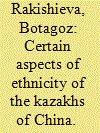

|
|
|
|
|
| Summary/Abstract |
There are about 5 million Kazakhs living all over the world outside the Republic of Kazakhstan, the largest part of them predictably found in the Xinjiang-Uyghur Autonomous Region of the PRC bordering on Kazakhstan
|
|
|
|
|
|
|
|
|
|
|
|
|
|
|
|
| 2 |
ID:
115817
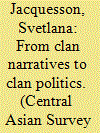

|
|
|
|
|
| Publication |
2012.
|
| Summary/Abstract |
This essay focuses on clan narratives as cultural tools in a particular sociocultural setting where mass literacy meets mass media. It shows how the interactions between different producers of clan narratives - the news media, the academic establishment and an intellectualist movement for the recovery of Kyrgyz history and culture - have resulted in a profound reshaping of the content of clan genealogies, of the claims of their compilers and, more significantly, of the ways various social actors relate to clan identities. Based on these analyses, it is argued that social representations and social practices related to genealogy and clans have undergone significant changes over the last 15 years, and that the production and consumption of clan narratives have played a crucial role in this transformation.
|
|
|
|
|
|
|
|
|
|
|
|
|
|
|
|
| 3 |
ID:
103137
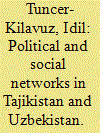

|
|
|
|
|
| Publication |
2009.
|
| Summary/Abstract |
A major debate among scholars studying Central Asian societies concerns the structure of social and political networks in the region. Still unresolved is the issue of whether to define such networks in terms of 'clans', 'regionalism', or personal networks. This article, based on data collected during fieldwork in Tajikistan and Uzbekistan, attempts to understand these social and political networks. It suggests that networks are very complex. The networks in Tajikistan and Uzbekistan draw on various loyalties including ties of family, friendship, work, education, and patron-client relationships. They are neither purely regional nor purely clan-based. Personal networks, factions, and self-interest play important roles. At the elite level, networks more closely resemble patron-client networks, which may or may not include regional or kinship ties. Among ordinary people, such ties tend to be based on localism, kinship, and/or patronage relationships.
|
|
|
|
|
|
|
|
|
|
|
|
|
|
|
|
| 4 |
ID:
143209
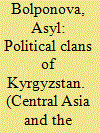

|
|
|
|
|
| Summary/Abstract |
The author traces the history of the clan system and its evolution as part of the political processes unfolding in Kyrgyzstan. She relies on facts to demonstrate that the clan system of our days is a product of classical unification of tribes into clans.
|
|
|
|
|
|
|
|
|
|
|
|
|
|
|
|
| 5 |
ID:
095555
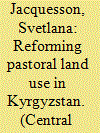

|
|
|
|
|
| Publication |
2010.
|
| Summary/Abstract |
The question of pastoral land use in colonial Central Asia is set against the goals and assumptions of present-day laws and regulations in Kyrgyzstan. In order to highlight the main choices of the colonial administration and their consequences on the local level the analysis is focused on three dyads: territorial divisions versus clan divisions, ownership versus administration and administration versus self-government. By pointing out that the colonial reforms on nomads were mainly driven by the phantoms of 'clans' and 'custom', this article argues that certain misconceptions of nomadism are characteristic of any modernization programmes, be they those of colonial Russia or those that are currently being implemented. In Kyrgyzstan the recently introduced 'grazing committees' as the main actors in the management and control of pastures perpetuate the myths of self-government and tradition among nomads. In conclusion the article advances the thesis that the reliance on 'custom' and 'tradition' and the dismissal of real social relations of pastoral land use are among the most important reasons for the failure of pastoral land reforms in the past and in the present.
|
|
|
|
|
|
|
|
|
|
|
|
|
|
|
|